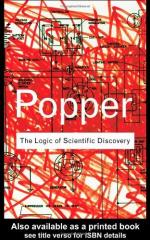
|
| Name: _________________________ | Period: ___________________ |
This quiz consists of 5 multiple choice and 5 short answer questions through Part II: Chapter 5, The Problem of Empirical Basis.
Multiple Choice Questions
1. According to conventionalism, what is required to make determinations of the natural world?
(a) Theories.
(b) Proofs.
(c) Laws.
(d) Inferences.
2. What deductive tests compare conclusions?
(a) Empirical applications.
(b) Internal consistency.
(c) Investigations.
(d) Comparing theories.
3. What is the concept of simplicity a part of according to Popper?
(a) Framework of induction.
(b) Logical reasoning.
(c) Infinite regress.
(d) Metaphysical logic.
4. For a theory to be falsifiable, what must it prohibit?
(a) Logic.
(b) Previous theories.
(c) Conventionalism.
(d) At least one occurrence.
5. How many conditions must a statement satisfy in order to be falsifiable?
(a) 2.
(b) 3.
(c) 5.
(d) 4.
Short Answer Questions
1. Demarcation is based on what definition of Popper's?
2. Statements that rule things out rather than include more things are considered what type of statements?
3. What does Popper consider existential statements to be?
4. What does Popper say methodological rules are?
5. With what does psychologism concern itself?
|
This section contains 155 words (approx. 1 page at 300 words per page) |

|




